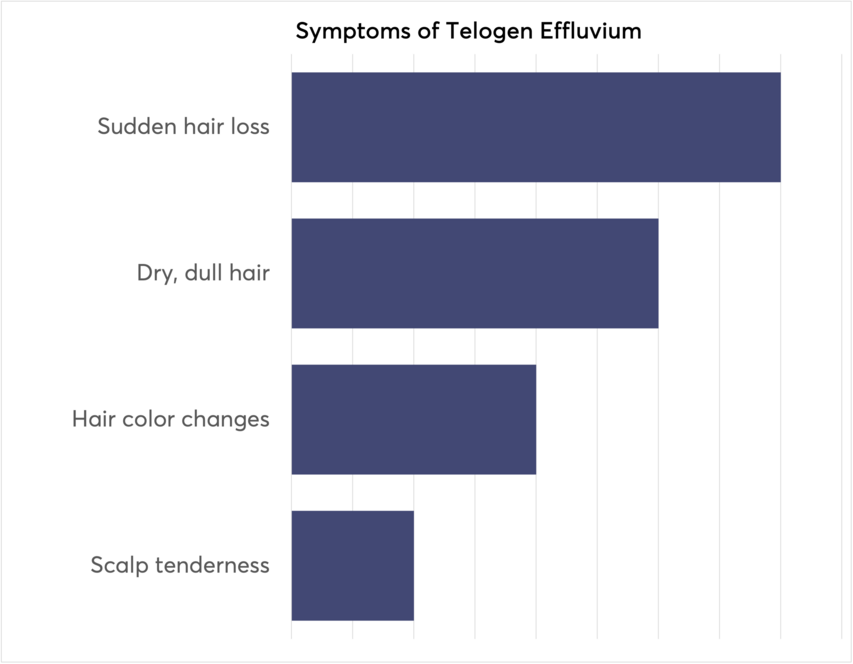Best treatments for stress-induced hair loss

Hair shedding is a part of our normal hair cycle. A few strands in the hairbrush and shower drain scattered across the living room floor are nothing to worry about. But if you find that you're pulling hairs out by the handful, it could be a sign that there's something wrong, and stress and anxiety could be to blame. You may have heard the claims that there is a link between emotional stress and hair loss, but is there any truth to them?
Can stress cause hair loss?
Absolutely. Research shows there is a relationship between stress and the natural hair cycle. There are approximately 100,000 hair follicles on the adult scalp, and each hair continually cycles between periods of rest and growth.
At any given time, most scalp follicles are in the growth (anagen) phase of the cycle. Hair strands are shed when the follicle transitions to the resting (telogen) phase. During stress, a trigger can cause an abnormal, sudden shift of the hair to the telogen phase, which results in dramatic hair loss.
A recent study published in Nature has shown that cortisol, the stress hormone, is the cause of stress-related hair loss. Acute or chronic stress releases more cortisol, which inhibits the activity of the hair follicle stem cells, reducing the production of new hair.
When under stress, cortisol production increases, and this can constrict the blood flow, decreasing oxygen and nutrients to the follicle while suppressing the immune system. When chronic stress or trauma occurs, sudden hair loss can result. Increased levels of stress hormones affect the nervous system and can create hormonal imbalances over time. When stimulated, nerve cells surround the hair bulb and may cause hair loss or even trigger an autoimmune response in the follicle, which can cause Alopecia Areata.
The Science of Stress-related Hair Loss
Recent research has shed light on the molecular mechanisms behind the connection between stress and hair loss, confirming previous clinical observations. Chronic stress triggers the release of substances like nerve growth factor (NGF) and substance P (SP) from nerve fibers surrounding the hair follicles. This release activates mast cells, releasing inflammatory substances such as histamine and TNF-a, leading to inflammation, early hair follicle regression (catagen), and hair growth inhibition. Additionally, SP has been found to disrupt the immune balance of the follicles, making them susceptible to inflammatory processes and subsequent hair loss. Elevated stress levels also produce excess stress hormones like cortisol, directly contributing to hair loss by inducing hair follicle regression and inhibiting hair growth.
Furthermore, the hair follicle has its own stress hormone production system, similar to the hypothalamic-pituitary-adrenal axis, which further amplifies mast cell degranulation and inflammation. Studies have shown that chronic stress affects the balance of immune signaling molecules and compromises the production of other hormones essential for hair follicle health. Therefore, managing and reducing stress levels and targeting the downstream effects of stress (inflammation, oxidative stress, and immune dysregulation) should be an integral part of any hair loss treatment and prevention strategy. Although there are no specific stress-targeting medications, utilizing multi-targeting therapeutics with stress-adaptogenic properties can be a viable approach.
What are the types of stress-related hair loss?
Stress and anxiety can play a role in hair loss and are linked to 3 conditions that may trigger you to lose hair.
Telogen effluvium (TE)
Telogen effluvium (TE) is one of the most common causes of temporary hair loss seen by dermatologists. In addition to stress, telogen effluvium may be caused by changes in hormone levels and poor nutrition. In most cases, it will last for less than six months (acute telogen effluvium). In people with a familial tendency for hair loss, hair thinning can continue for extended periods and progress to permanent female or male pattern alopecia.
Trichotillomania
Trichotillomania, also known as "hair-pulling disorder," is a psychological condition where people pull on hair from the scalp, face, and other parts of the body to deal with negative emotions such as stress, depression, and anxiety. This leads to patchy baldness in the affected areas. Trichotillomania is most commonly found in preteens and can last a lifetime.
Alopecia areata
In this condition, the body's immune system attacks hair follicles, causing them to fall out. The exact cause of alopecia areata is unknown, but doctors suspect that stress may trigger this autoimmune disease. In alopecia areata, hair loss presents in several round patches on the scalp or over the entire head. The hair may grow back and fall out repeatedly over time.
Antidepressants as a cause for more hair loss
Taking certain antidepressants can also cause more hair loss. These include Bupropion (Wellbutrin), fluoxetine (Prozac), paroxetine (Paxil), sertraline (Zoloft) (Cymbalta), venlafaxine (Effexor) and desvenlafaxine (Pristiq)).
What are the symptoms of telogen effluvium (TE)?
Symptoms include:
- Noticeable hair loss during washing that starts abruptly.
- Scalp itchiness and tenderness without scalp redness or visible dandruff (known as trichodynia).
- A generalized hair thinning.
- Dry, dull hair that is easily pluckable.
- Unexplained hair color changes.

What are the best treatments for stress-induced hair loss?
To rule out other causes of hair loss, you should advise your family physician to do a few basic lab tests, including CBC, iron, thyroid function, anti-nuclear antibodies, and a hormone profile. In addition to the blood tests, you may want to start a hair loss treatment with an active scalp treatment serum to help hair follicles stay in the growth phase longer and help build new hair.
For optimal results, it can be combined with a restore treatment shampoo to clean and stimulate hair follicles, hair restore supplements to replenish essential vitamins and minerals, and collagen peptides to provide the building blocks for growing new hair.
What is the best scalp serum for people with stress-related hair loss?
The MDhair Restore Serum stimulates blood circulation in the scalp, adds essential vitamins and minerals needed for hair regrowth, and acts as an antioxidant to reduce the harmful effects of toxic chemicals and air pollution.
What is the best shampoo for stress-related hair loss?
The MDhair Restore Shampoo combines DHT-blocking agents with dermatologist-tested botanicals to support healthy, natural hair growth, improve hair quality, and provide fuller-looking hair.
It contains a highly effective blend of over 20 powerful ingredients, including berry extract, ginseng root, rosemary leaf oil, pumpkin seed oil, tea tree oil, and argan oil. Probiotic lactobacillus ferment facilitates the production of antioxidants while strengthening the scalp's immunity and bacterial (biome) balance. Keratin and plant proteins reduce the hair's porosity, minimize breakage, and eliminate frizz and tangles.
What are the best supplements for stress-related hair loss?
The MDhair Restore Hair Wellness Supplements were specially formulated to replenish the vitamins, minerals, and other micronutrients essential for hair regrowth. They contain a powerful formula featuring biotin, Vitamin C, Vitamin E, Vitamin B6, Vitamin B12, Pantothenic Acid (Vitamin B5), iron, magnesium, zinc, selenium, manganese, and chromium to support thicker, stronger, healthier hair.
More tips to reduce stress-related hair loss
1. Learn and practice relaxation techniques
Managing stress before it can negatively affect your health is vital to preventing hair loss. The first step is to identify stressors and discover ways to overcome them.
Exercises such as walking, dancing, and yoga are great ways to minimize stress levels and release endorphins, which are chemicals that bring feelings of positivity, euphoria, and well-being. Mindfulness activities such as meditation, deep breathing, and journaling are also fantastic at mitigating anxiety and helping to clear the mind of negativity.
2. Eat a healthy diet and consider taking collagen supplements
When stressed, it is common to be tempted to skip healthy food and reach for "comfort food" options such as sweets, fried foods, and high-calorie meals. Over time, nutritional deficiencies can lead to further hair loss. Foods high in lean protein, iron, and vitamins A, E, K, and B can promote hair regrowth and reverse the signs of telogen effluvium.
Collagen is a structural protein that strengthens the tissues within the body and supports skin elasticity, hydration, heart health, and more. It acts like a trampoline, providing a supportive base for our skin to give it a vibrant, firm appearance. And while collagen is often famed for its skin-boosting benefits, evidence supports that this potent protein can also have incredible benefits for our hair.
The MDhair Marine Collagen Peptides, sourced from wild-caught deep-sea fish, were specially formulated to help regrow healthier and thicker hair. They are enhanced with vitamin C and hyaluronic acid to keep your hair well-hydrated and boost the production of new collagen.
3. Be mindful when washing and styling your hair
A good hair routine is crucial for improving hair health and growth. Add a leave-in treatment to protect the cuticles after washing your hair with a gentle shampoo and conditioner. When styling with heat, always use a protective spray with conditioning ingredients to prevent further damage and breakage to the hair strands.
What are the best treatments for stress-related hair shedding in people with a tendency for androgenetic hair loss?
If you have a familial tendency for androgenetic hair loss, you may want to add minoxidil to your hair treatment routine. Using minoxidil can help reduce the risk of permanent hair thinning.
Topical minoxidil
Topical minoxidil is an over-the-counter (OTC) medication available as a cream, foam, or spray. It can be used on the scalp, eyebrows, or beard to promote and prolong the hair cycle's anagen phase. Variations are available for male and female use.
What are the best treatments for alopecia areata?
Corticosteroids
Corticosteroids are topical or injectable medications used to treat hair loss caused by autoimmune conditions, including alopecia areata. These treatments often occur every 4 to 6 weeks, and hair can grow in as little as four weeks. Steroid injections can be used alongside other treatment options to treat hair loss.
The takeaway about stress-induced hair loss
If your hair loss is stress-related, your hair follicles are most likely not damaged. This means effectively managing your stress and increasing your overall health can make your hair grow better than ever. Taking the right supplements and using a scalp treatment serum can help reduce hair shedding and prevent permanent hair thinning.
Shop:
References
- The biology of hair follicles
- Diet and hair loss: effects of nutrient deficiency and supplement use
- The structure of people's hair
Find the most effective hair growth products for you by taking the free hair assessment.



